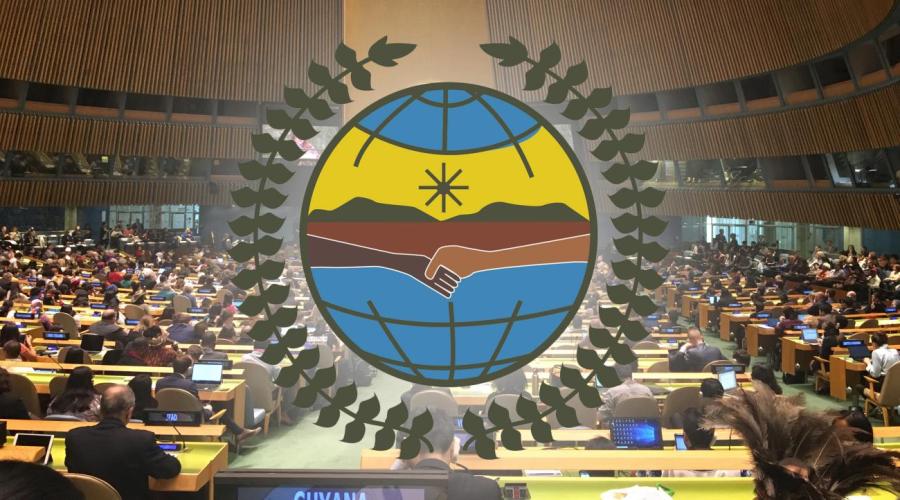In August 1990 the UN Sub-Commission on the Prevention of Discrimination and the Protection of Minorities agreed to invite its Norwegian expert member, Asbjorn Eide, to undertake a study on Possible Ways and Means of Facilitating the Peaceful and Constructive Solution of Problems Involving Minorities. An edited version of that research has been written specifically for the Minority Rights Group Report New Approaches to Minority Protection (December 1993) and can be obtained from Cultural Survival's Publications Department.
Eide's study involved a survey of the policies and practices towards minorities of all governments. He also invited international non-governmental organizations to contribute evidence and advice towards his study. Progress reports submitted to the UN in 1991 and 1992 were also received by member states of the Commission on Human Rights. In 1993, Eide held a major seminar convened by the UN Centre on Human Rights in Geneva. The Minority Rights Group (MRG) participated in this and also helped organize another in Geneva during which experts from different parts of the world could contribute towards Eide's final recommendations. These are probably the most comprehensive and valuable set of recommendations on the promotion of minor-ity rights and inter-community cooperation being presented in international fora.
They may be criticized for failing to consider a wide interpretation of peoples' right to self-determination or for consulting only with states rather than minority groups. These are criticisms of the UN system itself and of the mandate for the study; nevertheless, this research is a major contribution to the whole field of minority rights. It is therefore remarkable that the one UN forum that meets for four weeks to discuss `the Prevention of Discrimination and the Protection of Minorities' could only afford a little over two hours to discuss this item in their last week of business.
Procedurally it was no surprise that the full debate on this critical paper was postponed for another year, despite most of the Sub-Commission and the Commission on Human Rights' work being dominated by the consequences of failing to protect minorities. The present inability of the Sub-Commission to respond effectively to the Secretary-General's Agenda for Peace and to the issued that are leading to immense global suffering and insecurity requires a complete review of the Sub-Commission and the way in which the Commission on Human Rights considers minority issues. For example, their agenda and scheduling deserve better planning to take advantage of the considerable expertise gathered, while additional fora must be created to promote a constructive international debate. MRG believes that this report and recommendations must receive wide publicity full debate. The recommendations may be strengthened and implemented by different bodies.
The World Conference on Human Rights convened by Eide (June 1993) called upon the Commission on Human rights to examine ways and means to promote and protect effectively minority rights as set out in the United Nations Declaration on the Rights of Persons belonging to National or Ethnic, Religious and Linguistic Minorities (UN General Assembly resolution 47/135). It similarly urged states and the international community to do likewise. The establishment of a permanent working group that would advance both the UN Declaration on Minorities and the Eide study as well as review particular situations involving minorities would be one highly constructive way forward. Their relevance to regional peace and security alone demands that these issues are no longer marginalized within the UN structures.
The need to take very early action is perhaps the foremost thought among the richness of ideas in both this report and these recommendations. A failure to protect minority rights and an inability to build close inter-community cooperation can readily provide easy opportunities for politicians and bigots to exploit differences and misunderstandings, inciting local tensions and sometimes regional conflicts. Eide shows the immense difficulty of finding peaceful solutions once violence escalates. The challenge ahead lies in an investment of time and resources early on to implement both the UN Declaration on Minorities and the Eide recommendations. The recent experiences in former Yugoslavia and Angola show the cost of failing to make these investments.
RECOMMENDATIONS
The recommendations for protecting minorities are central to the report. The cost of preventive measures should be compared with the resources needed to assist the victims of violence once conflicts have begun and to redevelop once theire is stability. However, the greatest cost will be the change in attitude that is needed by the UN, its member states and often the majority and dominant community. It may require a change in political structures with a much more equitable sharing of power and existing resources.
The United Nations and its member states have never given human rights a particularly prominent role. Furthermore, until recently, minority rights has been a fringe issue within human rights activity, which has been dominated by Western lawyers concentrating on individual rights. However, the strong link made by the Conference on Security and Cooperation in Europe (CSCE) between military security, economic cooperation and the human dimension is having global influence.
The CSCE and its participating states have made a set of agreements on security, economic cooperation and the human dimension since the Helsinki Accords in 1972. Since the USA and the Soviet Union were the key actors in the negotiations (which were crucial to military security and the risk of a nuclear war), agreements were reached by total consensus and their mandatory implementation was closely monitored with agreed inspection mechanisms. A possible breach of a CSCE agreement was considered a very serious issue, and all states either conformed or endeavored to be seen as conforming. Thus some distinguished commentators suggest that the political regimes of the CSCE are much more effective than the legal or moral agreements of the UN.
The CSCE agreements were originally binding on 35 states, but in 1994 will involve 53 states. Within these agreements on Security and the Human Dimension, national minorities are seen as a crucial issue and the one most likely to lead to regional conflicts. However, these agreements have wider ramifications not only because 30% of the member states of the United Nations have reached binding agreements on the treatment of minorities, but also because such a framework is being seriously considered for African or South Asian states.
UN DECLARATION ON MINORITIES
The UN Declaration on Minorities, as the first exclusively devoted to the subject, is perhaps the single most important UN instrument on minority rights; but it is neither the beginning nor the end of UN efforts to promote and protect minority rights. Special measures or special rights for minorities or groups, and for persons belonging to such groups, also include those set forth in the International Covenant on Civil and Political Rights (Article 27); the Convention against Genocide; the International Convention on the Elimination of All Forms of Racial Discrimination; UNESCO's Convention Against Discrimination in Education; the Convention on the Rights of the Child; the UNESCO Declaration on Race and Racial Prejudice; the Declaration on the Elimination of All Forms of Intolerance and of Discrimination Based on Religious Belief; the Universal Declaration of Human Rights (Article 26); the International Convention on Economic, Social and Cultural Rights (Article 13); and the Declarations and Programmes of Action adopted in 1978 and 1983 by the two World Conferences to Combat Racism and Racial Discrimination.
The rights of minorities are not well understood, and there is a continuing debate over the relationship between group and individual rights. The UN Covenant on Civil and Political Rights under Article 27 declares:
In those states in which ethnic, religious, or linguistic minorities exist persons belonging to such minorities shall not be denied the right, in community with the other members of their group, to enjoy their own culture, to profess and practice their own religion, or to use their own language.
The Human Rights Committee - the treaty body charged with monitoring the observance of this Treaty by states' parties - is re-examining Article 27 in the light of the UN Declaration on Minorities. This new debate should reflect that the ways of achieving group rights for minorities are highly complex and remain poorly understood to this day. Few people appreciate that protecting and promoting the identity of minorities is a cardinal principle of minority rights. Nor do they realize that the protection of minority rights does not have to occur to the detriment of any other communities or of individual rights. Consequently, promoting minority identity is likely to remain a source of dynamic tension and misunderstanding in all multi-ethnic states.
Special measures for minorities, even for limited duration, remain a controversial issue and are often misunderstood as an exception to the `equal opportunities' and tilting the `level playing fields' concepts. Well-informed commentators have pointed out that where group rights of the majority are provided for by the state, the equivalent (not identical) group rights should also be provided for minorities. Minorities are members of a state; they contribute to its finances and should benefit from provisions for their language, religion, association and culture. This concept can be explored through `pluralism in togetherness' or `pluralism by territorial sub-division', as explained by Asbjorn Eide. Here the issues of participation, power sharing and devloution of power are central concerns, and a number of well-documented models of good practice include provisions under constitutional laws for minorities.
The UN Declaration on Minorities in its first article affirms that states shall protect the existence and the national or ethnic, cultural, religious and linguistic identity of minorities within their respective territories, and shall encourage conditions for the promotion of that identity. Here and elsewhere the Eide study and the UN Declaration on Minorities come together, with Eide providing the theoretical and practical framework for the development of the principles set forth in the UN Declaration on Minorities.
Article copyright Cultural Survival, Inc.


